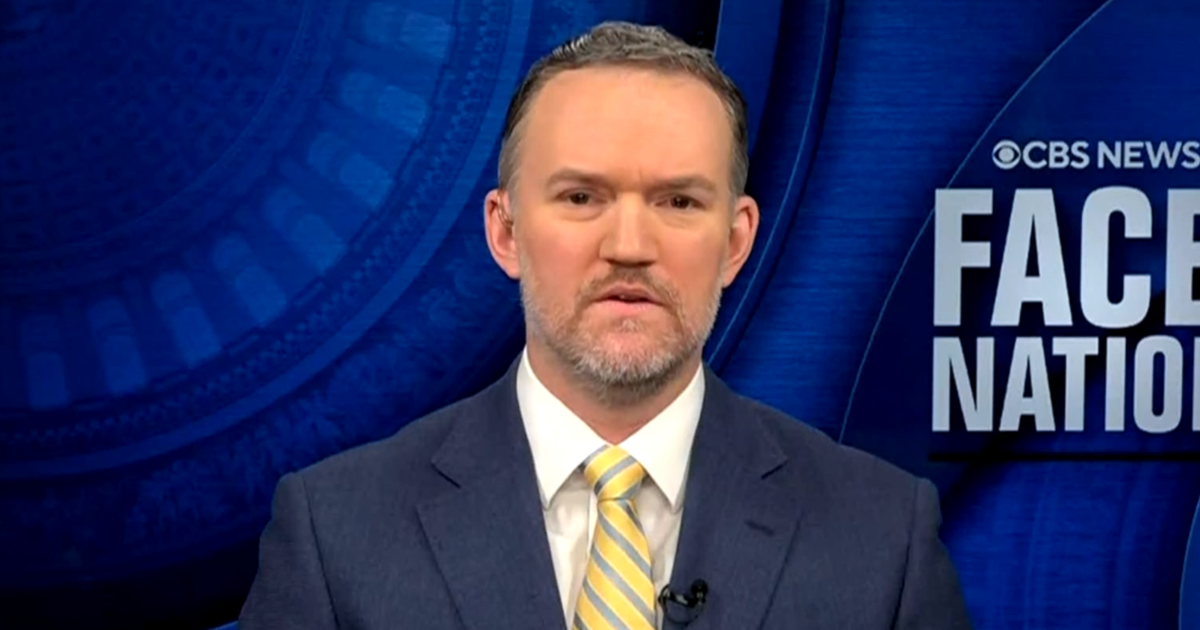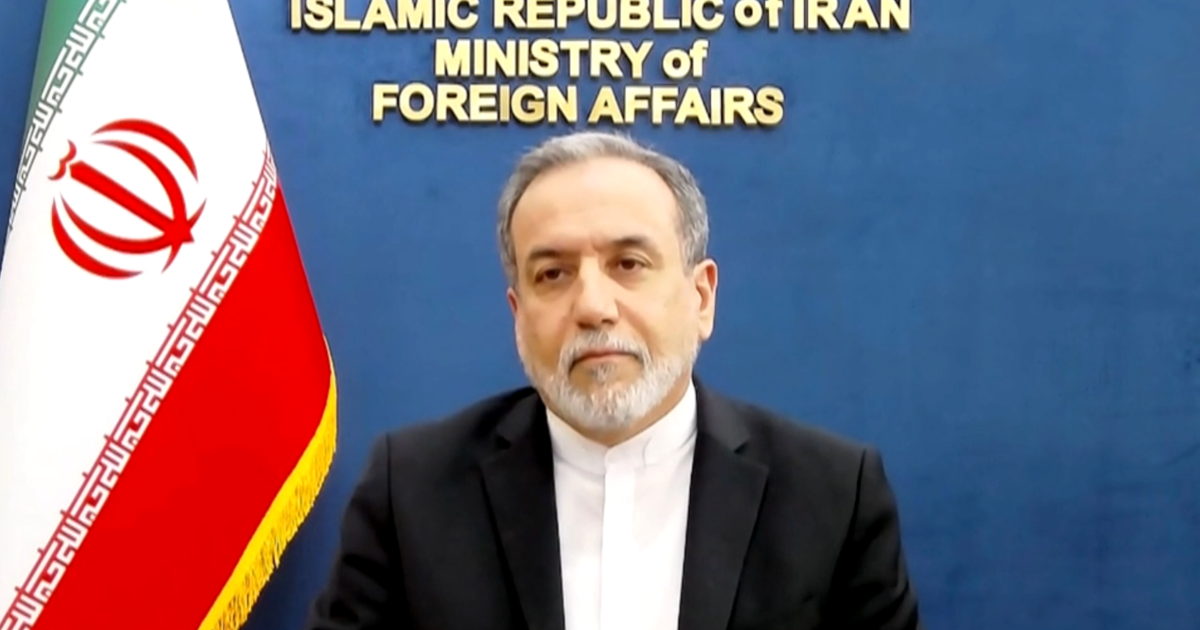Transcript: Jake Sullivan on "Face the Nation," March 13, 2022
The following is a transcript of an interview with White House national security adviser Jake Sullivan that aired Sunday, March 13, 2022, on "Face the Nation."
MARGARET BRENNAN: We go now to White House National Security Adviser Jake Sullivan, good morning to you, Jake.
NATIONAL SECURITY ADVISOR JAKE SULLIVAN: Good morning.
MARGARET BRENNAN: There are a lot of developments to get through with you. I do want to ask you about these reports that a US journalist has been killed in Ukraine by Russian forces. Do we know what the consequence would be for Russia killing an American?
SULLIVAN: Well, this is obviously shocking and horrifying, and I've just learned about it as I came on to air here, so I will be consulting with my colleagues, we'll be consulting with the Ukrainians to determine how this happened and then to measure and execute appropriate consequences as a result of it. I will just say that this is part and parcel of what has been a brazen aggression on the part of the Russians where they have targeted civilians, they have targeted hospitals, they have targeted places of worship and they have targeted journalists. And the United States has been working hard to hold Russia accountable through the imposition of the most far reaching- far reaching sanctions ever imposed and through the provision of military assistance to the Ukrainians to be able to blunt the Russian advance. And we will obviously be tracking this latest development very closely and responding accordingly.
MARGARET BRENNAN: Jake, there are reports of white phosphorus being used in Ukraine, reports of chlorine gas. How imminent is a chemical weapons attack in Ukraine?
SULLIVAN: We can't predict a time or place. All we can say is that there is an escalating level of rhetoric on the Russian side trying to accuse the Ukrainians and the United States of potentially using chemical or biological weapons. And that's a tell, Margaret. That's an indicator that in fact, the Russians are getting ready to do it and try and pin the blame elsewhere, and nobody should fall for that. That is why we've gone out so decisively at the United Nations Security Council and elsewhere to rob the Russians of the capacity to pin this on anyone other than themselves. And as the president said on Friday, if in fact the Russians do use chemical weapons in Ukraine, they will pay a severe price.
MARGARET BRENNAN: Overnight, Poland's president has said the use of a weapon of mass destruction would be a game changer for NATO. President Biden seemed to say military force is completely off the table in Ukraine, even if a weapon like this was used. Is that the case?
SULLIVAN: We are consulting with our allies and collectively we are communicating directly to the Russians. Sitting here before you today. I'm not going to go further than what President Biden said on Friday, which is that the Russians would pay a severe price if they were to move forward with chemical weapons.
MARGARET BRENNAN: But none of the sanctions you've imposed so far have stopped Putin. So is there any red line for the administration here in terms of humanitarian catastrophe that would change the president's calculus? Is this a game changer?
SULLIVAN: The use of weapons of mass destruction would be a- a shocking additional line that Putin is crossing in terms of his assault on international law and international norms. His assault on the human rights and human dignity of the people of Ukraine. But bottom line, Margaret, the premise of your question, which is, well, sanctions haven't stopped Putin so are they not working? I think we have to look at this in two respects. One is, have we imposed severe costs on Russia for its invasion of Ukraine? And the answer is yes. And the second is, have we been able to help the Ukrainians defend themselves against these attacks, to push back Russian forces from being able to take major cities, including the capital city Kiev? And the answer to that is yes as well. And part of the reason why Putin is resorting to the possibility of extreme tactics like the use of chemical weapons is because he's frustrated because his forces aren't advancing. And one of the reasons they're not advancing, the central reason is the bravery and skill of the Ukrainian people, but they are being supported by substantial amounts of military assistance from the United States and our allies.
MARGARET BRENNAN: Jake from- you said that consequences have been communicated to Russia, but from my reporting, I've heard there's no presidential contact, there's no secretary of state contact. The military leaders in Russia just aren't picking up the phone. You personally have communicated this to someone in the Russian government?
SULLIVAN: I'm not going to get specific about the nature of our communication with the Russians. I will also say that it's not just the United States that has channels to the Russians, but many of our allies and partners, and we coordinate closely in terms of what we communicate to them, how and on what topics. And that will continue, but it will continue through private diplomatic channels.
MARGARET BRENNAN: So yesterday, Russia's deputy foreign minister said convoys carrying Western weapons supplies are legitimate targets. That sounds like a threat. The US policy is to help Ukrainians defend themselves. How confident are you that you can keep those supply lines open?
SULLIVAN: We believe in our capacity to continue to flow substantial amounts of military assistance, weapons, and supplies to the front in Ukraine. We have been successful in doing so thus far and we believe that we have a system in place that will allow us to continue to do so, notwithstanding the Russian threats. And we believe that these weapons are making a significant difference in helping the Ukrainians defend themselves. Of course, we're merely helping provide the tools. The courage and the bravery and the frontline skill of these fighters is ultimately what's making the difference and the courage, bravery and skill of ordinary Ukrainian citizens, standing up and defending their towns and cities is what's making the difference, and we will continue to support them in their effort to ensure that Ukraine is a strategic failure for Vladimir Putin.
MARGARET BRENNAN: So that sounds like, yes, you can keep- help keep supply lines open. What we saw in the past few hours was an attack in the west of Ukraine, in- around Lviv. And that's just about 15 miles from the border with Poland. Jake, this is getting very close to NATO territory. Is the US policy that any strike into Polish territory or airspace, intentional or unintentional is an attack on NATO?
SULLIVAN: The president has been clear repeatedly that the United States will work with our allies to defend every inch of NATO territory, and that means every inch. And if there is a military attack on NATO territory, it would cause the invocation of Article Five, and we would bring the full force of the NATO alliance to bear in responding to it.
MARGARET BRENNAN: But that's an accidental errant shot?
SULLIVAN: Look, all I will say is that if Russia attacks, fires upon, takes a shot at NATO territory. The NATO alliance would respond to that.
MARGARET BRENNAN: It's been a very busy few hours for you. I'm tracking what is happening overnight as well in Iraq. Iran's Revolutionary Guard has now claimed responsibility for firing ballistic missiles into northern Iraq towards a location where the US consulate is located. Are you condemning Iran for carrying out this attack?
SULLIVAN: Of course. We condemn Iran for carrying out this attack. We're still gathering information on what precisely the target was. What we know at this hour, Margaret, is that no U.S. facilities were hit. No U.S. persons were harmed. But the United States is absolutely clear, we will do whatever it takes to defend our people, our interests, and our allies, and we are in consultation with the Iraqi government and the government in Iraqi Kurdistan, in part to help them get the missile defense capabilities to be able to defend themselves in their cities--
MARGARET BRENNAN: --So the nuclear deal is not dead?
SULLIVAN: This is not the first time Iran has- I'm sorry?
MARGARET BRENNAN: The nuclear deal that you're negotiating with Iran is not dead?
SULLIVAN: The- as things stand right now, they're- the- the various negotiators are back home in their capitals and we will have to see what happens in the days ahead with respect to the diplomacy around the nuclear deal. One thing I will say is that the only thing more dangerous than Iran armed with ballistic missiles and advanced military capabilities is an Iran that has all of those things and a nuclear weapon and President Biden is still determined to stop Iran from getting a nuclear weapon.
MARGARET BRENNAN: Jake, I have to let you go. Thank you for your time today. Face the Nation will be back in one minute. Stay with us.



